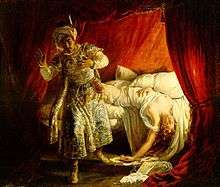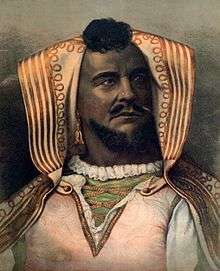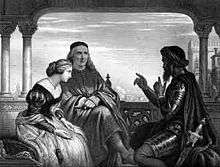Cultural references to Othello
The figure of Othello from the tragic play by William Shakespeare has appeared in many examples in art and culture since being authored by Shakespeare in the early 16th century.

In painting
The literary character of Othello and the plot of the play by Shakespeare has been a recurrent theme in painting for several centuries. Selected examples include 'The Plot' depicting Othello & Iago which was painted in Oil by Solomon Alexander Hart in 1855. He also painted a watercolour version held at the Victoria & Albert Museum in London. Othello was a series of 60 paintings executed in 1985 by Nabil Kanso. It was published in 1996 by NEV Editions.
 First Folio (1623) title page facsimile
First Folio (1623) title page facsimile Othello with Desdemona in bed asleep by Christian Köhler (1859)
Othello with Desdemona in bed asleep by Christian Köhler (1859) Othello and Desdemona in Venice by Théodore Chassériau (1819–1856)
Othello and Desdemona in Venice by Théodore Chassériau (1819–1856) Othello and Desdemona by Alexandre-Marie Colin, 1829
Othello and Desdemona by Alexandre-Marie Colin, 1829 The Death of Desdemona by Eugène Delacroix
The Death of Desdemona by Eugène Delacroix Edwin Booth as Iago, ca. 1870
Edwin Booth as Iago, ca. 1870 Italian actor Tommaso Salvini as Othello, 1875
Italian actor Tommaso Salvini as Othello, 1875 American actor John McCullough as Othello, 1878
American actor John McCullough as Othello, 1878 Othello relating his adventures to Desdemona and Brabantio from a steel engraving of a painting by Charles West Cope, 1873
Othello relating his adventures to Desdemona and Brabantio from a steel engraving of a painting by Charles West Cope, 1873- Desdemona's Death Song by Dante Gabriel Rossetti, ca. 1878–1881
_by_Frederic_Leighton.jpg) Desdemona by Frederic Leighton, ca. 1888
Desdemona by Frederic Leighton, ca. 1888- Petre Otskheli design for Othello, staged by Kote Marjanishvili, 1933
In opera
_par_F._Bouchot.jpg)
Otello, a four-act opera with an Italian libretto by Francesco Maria Berio di Salsa and music by Gioachino Rossini was first performed at the Teatro del Fondo, Naples, on 4 December 1816. The opera deviates from Shakespeare's original in some aspects: Iago is less diabolical than his Shakespearean counterpart, the setting is Venice rather than Cyprus, and the composer and librettist provided an alternative happy ending to the work, a common practice with drama and opera at one time.
Giuseppe Verdi and librettist Arrigo Boito adapted Shakespeare's play to Otello, an Italian grand opera in four acts that was first performed at the Teatro alla Scala, Milan on 5 February 1887. It was Verdi's second to last opera (followed by another Shakespeare adaptation, Falstaff) and is considered by many his greatest. The popular opera attracts world class singers and is found in the repertoire of prominent opera houses. Verdi and his librettist dispensed with the first act of the play. Franco Zeffirelli's 1986 film version of Verdi's opera starring Plácido Domingo as Othello was nominated for the BAFTA for foreign language film.[1] However, it did not win the award. According to the Kennedy Center's biographical note on Domingo, Laurence Olivier saw Domingo in Otello and, in a mock-furious voice, told Franco Zeffirelli: "You realise that Domingo plays Othello as well as I do, and he has that voice!"[2]
On 25 February 1999, Bandanna, an English language opera in a prologue and two acts with a libretto by Irish poet Paul Muldoon and music by Daron Hagen was performed by the opera theatre at The University of Texas in Austin. The opera is set in 1968 on the United States–Mexican border and borrows elements from Cinthio's tale, Shakespeare's play, and Verdi's opera.
In ballet
Mexican choreographer José Limón created a 20-minute, four character ballet called The Moor's Pavane to the music of Henry Purcell in 1949. The work premiered at the Connecticut College American Dance Festival in the same year. American Ballet Theatre was the first dance company outside Limon's to include the work in its repertory. It is a standard in dance companies around the world and notable interpreters of the Moor include Rudolf Nureyev.
The ballet Othello was choreographed by John Neumeier to music by Arvo Pärt, Alfred Schnittke, Naná Vasconcelos et al. and was premiered by the Hamburg Ballet in Hamburg on 27 January 1985, with Gamal Gouda as Othello, Gigi Hyatt as Desdemona, and Max Midinet as Iago. The work remains in the repertoire of the Hamburg Ballet, seeing its 100th performance in 2008.
In 2002, modern dance choreographer Lar Lubovitch created a full-length ballet in three acts based on the Shakespeare play and Cinthio's tale with a score by Elliot Goldenthal. The work has been staged by the San Francisco Ballet with Desmond Richardson, Yuan Yuan Tan, and Parrish Maynard in the principal roles. The ballet was broadcast on PBS's Great Performances: Dance in America and the program was nominated for an Emmy Award. The ballet is recorded on Kultur video. Othello was first performed in New York City at the Metropolitan Opera House, 23 May 1997, by American Ballet Theatre.[3]
Other ballets include Prologue choreographed by Jacques d'Amboise for the New York City Ballet in 1967 as a prequel to Shakespeare's play; Othello choreographed by John Butler to the music of Dvořák for Carla Fracci and the La Scala Theatre Ballet in 1976; and a version choreographed by Jean-Pierre Bonnefoux for the Louisville Ballet in the 1980s.
In film
- See also Shakespeare on screen (Othello).
Between 1948 and 1952, Orson Welles directed The Tragedy of Othello: The Moor of Venice (1952), produced as a black-and-white film noir. The film stars Welles as Othello and Suzanne Cloutier as Desdemona. The troubled production was filmed over the course of three years as Welles' time and money permitted, in Mogador, Morocco and Venice. Lack of funds (and costumes) forced Roderigo's death scene to be shot in a Turkish bath with performers wearing only large, ragged towels. The film won the Palme d'Or at the 1952 Cannes Film Festival.[4] Rather than focusing on racial disparity, the film plays on a difference between Desdemona and Othello in age, size and personal attractiveness. The film noir colouring of the picture minimised any commentary on Othello's blackness, to the point that the critic F. R. Leavis wrote that the film made no reference to Othello's colour.[4]
Unlike Welles's film, Stuart Burge's Othello (1965), based on John Dexter's National Theatre Company's production, starring Laurence Olivier, brings issues of race to the fore, with Olivier putting on an 'African accent' and entering in a large 'ethnic' necklace and a dressing gown. He commented, however, that he did "not dare to play the Moor as a full-blooded negro". One contemporary critic found the coloration too much, commenting that Olivier was "blacker than black, almost blue" .
Trevor Nunn's 1989 version filmed at Stratford, cast black opera singer Willard White in the leading role, opposite Ian McKellen's Iago.[4]
The first major screen production casting a black actor as Othello would not come until 1995 with Laurence Fishburne opposite Kenneth Branagh's Iago – not that there have been many major screen productions of Othello: most film versions to date have been filmed stage productions. It was made during the O. J. Simpson trial and commentators such as Cartmell draw parallels between the two whodunit murder stories, and wondered if the film's release was not a little to do with the publicity surrounding Simpson's drama.[4] A modernised, loose retelling, O, completed in 1999 and released in 2001, featured African-American actor Mekhi Phifer in the lead role, which was renamed from "Othello" to "Odin James" or "O. J.", with the story set in an American high school and revolving around sports rather than warfare.
Malayalam film Kaliyattam is an adapted version of Othello against the backdrop of the Hindu Theyyam performance. In 1998, Suresh Gopi received the National Film Award for Best Actor, and Jayaraj the award for Best Director for their work on the film.
Omkara is a version in Hindi set in Uttar Pradesh, starring Bollywood megastar Ajay Devgan as Omkara (Othello), Saif Ali Khan as Langda Tyagi (Iago), Kareena Kapoor as Dolly (Desdemona), Vivek Oberoi as Kesu (Cassio), Bipasha Basu as Billo (Bianca) and Konkona Sen Sharma as Indu (Emilia). The film was directed by Vishal Bhardwaj who earlier adapted Shakespeare's Macbeth as Maqbool. All characters in the film share the same letter or sound in their first name as in the original Shakespeare classic. It is one of the few mainstream Indian movies to contain uncensored profanity.
In other film adaptations
- 1909 silent film shot in Venice[5]
- 1909 German directed by, and stars, Franz Porten as Othello, Henny Porten as Desdemona, and Rosa Porten as Emilia.
- 1914 silent film shot in Venice[5]
- 1922 Othello, German, starring Emil Jannings as Othello, Werner Krauss as Iago, and Ica von Lenkeffy as Desdemona[5][6]
- 1947 Othello forms the backdrop for the 1947 film noir A Double Life in which actor Anthony Johns (Ronald Colman) becomes so immersed in the production, that he takes on the Moor's murderous jealousy in his real life.
- 1952 Othello, United States, directed by, and stars, Orson Welles as Othello, also starring Micheál Mac Liammóir as Iago, Robert Coote as Roderigo, Suzanne Cloutier as Desdemona, Michael Laurence as Cassio, Fay Compton as Emilia and Doris Dowling as Bianca.[7][8]
- 1956 Othello, USSR, starring Sergei Bondarchuk, Irina Skobtseva, Andrei Popov. Directed by Sergei Yutkevich.[9]
- 1956 Jubal, Western setting
- 1962 All Night Long (British) Othello is Rex, a jazz bandleader. Dave Brubeck and other jazz musicians.[10]
- 1965 Othello with Laurence Olivier, Maggie Smith, Frank Finlay, and Joyce Redman[11]
- 1974 Catch My Soul adapted from Jack Good's rock musical, directed by Patrick McGoohan and starring Richie Havens, Lance LeGault, Season Hubley and Tony Joe White.[12]
- 1982 Othello, the Black Commando written by and starring Max H. Boulois with Tony Curtis as Colonel Iago and Joanna Pettet as Desdemona[13]
- 1986 Otello, adaptation of Verdi's opera of the same name
- 1992 Champakulam Thachan, a Malayalam film.
- 1995 Othello with Kenneth Branagh, Laurence Fishburne, and Irène Jacob. Directed by Oliver Parker.[4][14]
- 1997 Kaliyattam in Malayalam, a modern update, set in Kerala, starring Suresh Gopi as Othello, which won him the national award for best actor, Lal as Iago, Manju Warrier as Desdemona, directed by Jayaraaj.[15]
- 2001 O, a modern update, set in an American high school. Stars Mekhi Phifer as Odin (Othello), Julia Stiles as Desi (Desdemona), and Josh Hartnett as Hugo (Iago).[16]
- 2002 Eloise a modern update, set in Sydney, Australia.
- 2004 Stage Beauty, a romantic period drama, set in the 17th century, on the theme of male and female actors playing women's roles – with the role of Desdemona as the example.
- 2006 Omkara, a Hindi film adaptation of Othello starring Bollywood megastar Ajay Devgan as Omkara (Othello), directed by Vishal Bhardwaj[17]
- 2008 Jarum Halus a modern updated Malaysian version, in English and Malay by Mark Tan.[18]
- 2012 Otel•lo,[19] a free adaptation directed by Hammudi Al-Rahmoun Font.
In television
- 1955 Othello, aired on BBC Television, with Gordon Heath as Othello. A telerecording of the broadcast still exists[20]
- 1981 Othello, part of the BBC's complete works Shakespeare. Starring Anthony Hopkins and Bob Hoskins.[21]
- 1990 Othello (1990) A videotaped version of the last Royal Shakespeare Company production at The Other Place starring Willard White, Ian McKellen, Clive Swift, Michael Grandage, Sean Baker, and Imogen Stubbs. Directed by Trevor Nunn.
- 2001 Othello. British made-for-TV film. A modern-day adaptation in modern English, in which Othello is the first black Commissioner of London's Metropolitan Police. Made for ITV by LWT. Scripted by Andrew Davies. Directed by Geoffrey Sax. Starring Eamonn Walker, Christopher Eccleston and Keeley Hawes.[22]
- 2008 Othello, The Tragedy of The Moor. A two-hour television adaptation starring Carlo Rota in the title role. Director Zaib Shaikh maintains the theatrical feel of the play, while shooting in a studio controlled environment. Also starring Matthew Deslippe as Iago, Christine Horne as Desdemona, Graham Abbey as Cassio. The adaptation was co-written by Zaib Shaikh and Matthew Edison.[23]
- 2011– An Indian daily soap named "Gunahon ka Devta" aired on Imagine TV was loosely based on Shakespeare's famed Othello
In music
- In 1891-2, the Bohemian/Czech composer Antonin Dvořák composed the overture 'Othello', Op 93 (cf Othello)
- In 1914, the Ukrainian-born Sergei Bortkiewicz composed his orchestral Symphonic poem after 'Othello', Op 19.
- In 1963, the Soviet composer Vladimir Yurovsky finished his tragic Symphonic poem for a narrator, choir and orchestra after 'Othello', Op. 58.
- In 1987, Australian singer Paul Kelly wrote a song called "Desdemona", a reference to Othello's love interest.
- Chicago based hip-hop group Q Brothers created a modern adaptation with Othello being a record producer called "Othello: The Remix."
- In 2016 R&B artist Frank Ocean referenced Othello in his song Nikes "Must be on that white like Othello".[24]
- "Send Them Off!", song by British band Bastille is inspired by both Othello and the classic horror film The Exorcist.[25]
- In 2017 singer-songwriter Harry Styles referenced Act III Scene III in his song "Sweet Creature."[26]
Graphic novels
Othello, an adaptation by Oscar Zárate, Oval Projects Ltd (1985). It was reprinted in 2005 by Can of Worms Press and includes the complete text of the play.
In January 2009, a manga adaptation was published in the United Kingdom, with art by Ryuta Osada. It is part of the Manga Shakespeare series by Richard Appignanesi, and is set in Venice in carnival season.[27]
Fiction
Christopher Moore combines Othello and The Merchant of Venice in his 2014 comic novel The Serpent of Venice, in which he makes Portia (from The Merchant of Venice) and Desdemona (from Othello) sisters. All of the characters come from those two plays with the exception of Pocket, the Fool, who comes from Moore's earlier novel based on King Lear.
I, Iago by Nicole Galland depicts the antagonist of the play, Iago, as the protagonist and explores his potential motivations and history.
The plot of the Portuguese language novel Dom Casmurro by the Brazilian author Machado de Assis, a translator of Othello into Portuguese, is based upon the play. It is generally considered one of the great novels of Brazilian literature.
In 2017, Hogarth (a division of Penguin Random House company) published, as part of the Shakespeare Project, a novel by Tracy Chevalier, New Boy. The characters from Othello are transposed in a Washington D.C. school where eleven-year-old boys and girls re-enact the shakespearian tragedy but in the 1970s.
Other
- Othello Cake, Danish cake with a Macaron base, cream and chocolate glaze. The cake is named after the play, with the white cream and dark chocolate signifying the relationship between Desdemona and Othello.[28]
References
- Otello (1986)
- "Biographical information for Placido Domingo". Kennedy Center. Archived from the original on 14 August 2009. Retrieved 1 November 2009.
- "Great Performances . Dance in America: Lar Lubovitch's "Othello" from San Francisco Ballet". PBS. Retrieved 1 November 2009.
- Cartmell, Deborah (2000) Interpreting Shakespeare on screen Palgrave MacMillan pp72-77 ISBN 978-0-312-23393-8
- Buchanan, Shakespeare on Silent Film (2009)
- Othello (1922) IMDb
- https://www.imdb.com/title/tt0045251
- Brigitte Tast, Hans-Jürgen Tast: Orson Welles – Othello – Mogador. Aufenthalte in Essaouira, Kulleraugen Vis.Komm. Nr. 42, Schellerten 2013, ISBN 978-3-88842-042-9
- See Отелло on IMDb
- All Night Long (1962)
- Othello (1965)
- "Catch My Soul (1974)".
- IMDb Othello, the Black Commando
- Othello (1995) IMDB
- Kaliyattam (1997)
- O (2001) IMDb
- Omkara (2006)
- "Jarum Halus official website". Jarumhalus.com. Archived from the original on 2 September 2013. Retrieved 18 August 2013.
- otello.cat
- Wyver, John (3 March 2012). "Othello (BBC, 1955) | SCREEN PLAYS". Screenplaystv.wordpress.com. Retrieved 18 August 2013.
- Othello (1981) (TV)
- Othello (2001) (TV) IMDb
- "Othello". Canadian Broadcasting Corporation. Retrieved 18 August 2013.
- https://genius.com/10261679
- https://twitter.com/bastilledan/status/677291430188978176
- "Sweet creature". Genius. Retrieved 27 September 2018.
- http://www.mangashakespeare.com/titles/othello.html
- "Othellokage". La Glace (in Danish). Conditori La Glace. Retrieved 10 October 2018.
| Library resources about Cultural references to Othello |
External links
| Wikisource has original text related to this article: |
| Wikiquote has quotations related to: Cultural references to Othello |
- The Annotated Othello Complete text of Othello with explanations of difficult words and passages. No ads or images.
- Othello Navigator—Includes the annotated text, a search engine, and scene summaries.
- Cinthio's Tale—A 19th-century English translation of Shakespeare's primary source.
- Othello—analysis, explanatory notes, and lectures.
- Othello—Scene-indexed and searchable version of the text.

- Cultural references to Othello at the Internet Broadway Database – lists numerous productions.
- Othello study guide, themes, quotes, multimedia, and teacher resources
- Othello Act and scene wise summary & quotes, analysis, characters, topic discussions.
- Othello at the British Library
- Othello—Annotated text aligned to Common Core standards.
.png)